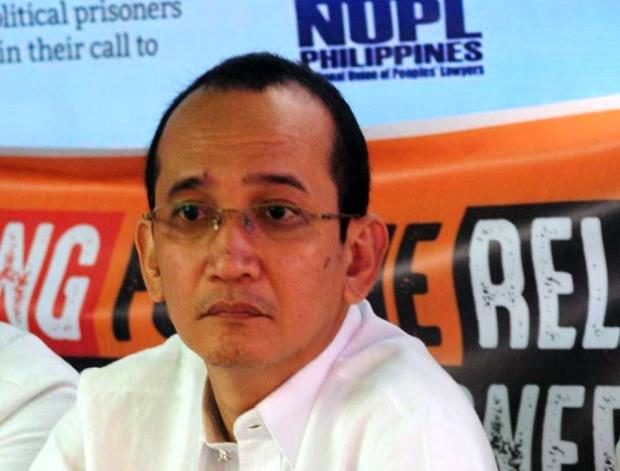Human rights advocates slammed on Wednesday President Rodrigo Duterte’s decision to withdraw from the treaty that formed the International Criminal Court (ICC), saying that the “self-serving” move was to “cheat his way out of responsibility.”
National Union of Peoples’ Lawyers (NUPL) President Edre Olalia said that Duterte’s move was a “cop out” or an attempt to avoid the looming ICC investigation on his bloody campaign against illegal drugs.
“It is a cop out. It jumps the gun on his potential legal liability or responsibility. He wants to be immune and act with impunity both under domestic law and under international law,” Olalia said in a statement.
“The legal reasoning and factual narrative of the withdrawal are novel at best and skewed at worst,” he added.
Olalia said that the basis for the withdrawal was “either premature, assumed a fact not established, conclusory or inapplicable.”
Duterte on Wednesday announced the Philippines’ withdrawal from the Rome Statute, the treaty that establishes the ICC.
He cited the “baseless, unprecedented and outrageous attacks” against him and his administration by United Nations special rapporteur Agnes Callamard and UN High Commissioner on Human Rights Zaid Ra’ad al-Hussein and ICC special prosecutor Fatou Bensouda.
READ: Duterte announces PH withdrawal from ICC treaty
Karapatan Secretary General Cristina Palabay disputed Duterte’s claims that he and his administration were being denied due process and playing victim.
“Today, the country has been made aware that the tyrant is a mere coward who plays tough with words but flinches when confronted with concrete platforms for accountability,” Palabay said in a statement.
“This is a classic Duterte move to cheat his way out of culpability and responsibility for all the rights violations systematically committed by him and his State forces,” she added.
The ICC in February launched a preliminary examination on Duterte’s bloody campaign against illegal drugs, which was believed to have killed thousands of suspected drug criminals.
The preliminary examination stemmed from the complaint of Jude Sabio, lawyer of Edgar Matobato, a self-confessed hitman of the Davao Death Squad, a vigilante group linked to Duterte when he was still mayor of Davao City.
It will determine if there is a “reasonable basis” to proceed with an investigation in accordance to the criteria established by the Rome Statute.
The ICC has jurisdiction on genocide, crimes against humanity, and war crimes.
Duterte justifies withdrawal from treaty
Duterte announced on Wednesday the country’s withdrawal from the treaty as there appeared to be a “concerted effort” between the United Nations special rapporteurs and the ICC special prosecutor to paint him as a “ruthless and heartless violator of human rights who allegedly caused thousands of extrajudicial killings.”
In February, the ICC launched a preliminary examination into Duterte’s bloody war on drugs, which was criticized to have killed thousands of suspected drug criminals and have stemmed to alleged extrajudicial killings.
The President, who is accused of stoking the killings with inflammatory statements, has taken issue over the Philippines becoming the first southeast Asian nation put under a preliminary examination by the ICC prosecutor.
Opened in 2002, the ICC is the world’s only permanent war crimes court and aims to prosecute the worst abuses when national courts are unable or unwilling.
The Philippines, under previous President Benigno Aquino, ratified in 2011 the Rome Statute which underpins the ICC, giving the tribunal authority to investigate crimes on its soil.
On Wednesday Duterte, a former lawyer, attacked the ICC’s preliminary examination into his anti-narcotics campaign saying it was “unduly and maliciously created.”
“It is apparent that the ICC is being utilized as a political tool against the Philippines,” he said.
In his statement, Duterte cited “baseless, unprecedented and outrageous attacks on his person as well my administration.”
“The acts allegedly committed by me are neither genocide nor war crimes. The deaths occurring in the process of legitimate police operations lacked the intent to kill,” he added.
But even as early as October 13, 2016, when Duterte had only been in office less than four months, the ICC prosecutor Fatou Bensouda said in a statement that she was “deeply concerned” over reports of extra-judicial killings of over 3,000 alleged drug users and pushers.
Philippine officials had initially said in February that the country was ready to cooperate but asked for fairness.
Duterte’s spokesman Harry Roque also said they would refuse a visit by one such rapporteur Agnes Callamard, who had previously been pressing to investigate the killings.
But Roque has also said the ICC has no jurisdiction over the case because the tribunal was intended as a “court of last resort” and the Philippine courts were fully functioning. With a report from Agence France Presse/ac
